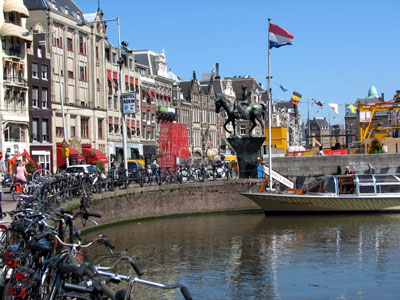Pursuing Higher Studies in Netherlands

Nepali students are eager to gain international degrees and choose different foreign countries to pursue their higher education.Among different nations, the Netherlands has been one sought after destination since the early 1970's. Every year about 100 Nepali students attend an international programme in the Netherlands.
Engineering, Law, Social Sciences and Management are a few popular subjects for Nepali students in the Netherlands.
Studying in the Netherlands means to equip for the challenges ahead in the international market after completion of their education. The Dutch higher education institutions together offer 1,560 international study programmes and courses, 1,543 of which are taught entirely in English.However, those who want to pursue their higher studies should consider a few things before proceeding.
Courses offered
The Netherlands offers a large variety of study programmes in different disciplines, including degree programmes, short courses, summer courses, training modules and so on. Research universities and universities of applied sciences are two main types of higher institutions whereas institutes for international education are a third smaller branch of higher education here.
Institutes for international education offer Master's programmes, but no Bachelor's programme whereas universities of applied sciences award both types of degrees.
Eligibility criteria
Students who enrol in higher education programmes will obtain a Bachelor's degree upon completion of the undergraduate phase, and a Master's degree upon completion of the graduate phase. Research universities' Bachelor's degree programme requires three years of study (180 credits). A Bachelor's degree programme offered by universities of applied sciences re quires four years of study (240 credits). A research-oriented Master's programme requires one to three years (60-180 credits) of study.
Graduates obtain a Master of Arts or Master of Science (MA/MSc) degree. A Master's degree awarded in the applied arts and sciences requires the completion of 60120 credits. PhD degrees are only offered by research universities.
It is essential for foreign students to be able to speak, read and write in English.Students must have passed an English language test.IELTS and TOEFL are com monly accepted, but institutions may accept other tests as well. The required scores are at least 550 (paper based) or 213 (computer based) for TOEFL. For IELTS, a score of at least six is required.
The Netherlands Fellowship Programmes (NFP)
Patricia Fetz Chettri, Fellowship Officer/Assistant Consular Officer of The Netherlands Consulate in Nepal shares, “The NFP is targeted at mid-career professionals who are nationals of and working and living in one of the 60 NFP countries of which Nepal is one. Women and members of priority groups or marginalised regions are specifically invited to apply for an NFP Fellow ship. And he/she must have already got admission in one of the universities there be fore applying for fellowship.“
According to Chettri, NFP offers individual fellowships for Master's degree pro grammes, short courses and PhD studies. The fellowship can cover the costs of tuition fees, visa, travel, insurance and thesis research, as speci fied in the NFP rules and reg ulations for fellowship hold ers. The eligibility criteria in clude the person should be mid-career professional with at least three years rele vant work experience.
He/she should be nominated by his or her employer who pledges to continue paying the candidate's salary and guarantees that the can didate will be able to return to the same or equivalent position at the end of the fellowship period.
Dakshina Shrestha, Vice Principal at Kathmandu Engineering College, who was recently nominated for three-week long NFP fellowship programme shares, “I wanted to do thesis in Leadership Management and while searching on the net, I found that the course is taught in the Netherlands.
Later I applied for the fellowship programme and was chosen for it. NFP has made it easier for me to have all the access like accommodation, allowance, medical insurance and more.” However, she strictly warns not to take help from consultancies. “One must search on the Internet for the desired course in desired or suitable destination they need to study. But most of the students are unsure of what they are looking for.“
According to Cuelenaere, it is hard to maintain the daily needs and living standards of the Netherlands. “They must be well prepared for the challenges they are going to face during their student life in Netherlands. The work permit for the students are 10 hours per week and the expenses in Netherlands is 850 Euros or more per month.“
Naresh Pradhan, President of Netherlands Alumni Association of Nepal (NAAN) shares, “Students who study through NFP fellowship need not struggle for living in the Netherlands but those on their own face difficulties as they are unaware about the environment there. So, students should be well prepared before going to study in the Netherlands.“
Important sites
http://www.nuffic.nl/nfp
http://www.studyinholland.nl
http://www.internationalstudy.nl
http://www.netherlandsconsulate.org.np
source: Shrestha, Sangita(2011),"Pursuing Higher Studies in Netherlands", The Himalayan Times, 9 Nov 2011
Posted on: 2011-11-10































